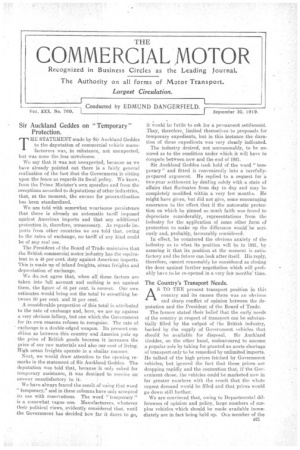Sir Auckland Geddes on " Temporary " Protection. .
Page 1

If you've noticed an error in this article please click here to report it so we can fix it.
THE STATEMENT Made by Sir Auckland Geddes to the deputation of commercial vehicle manufacturers was, in substance, not unexpected, but was none the, less unwelcome.
We say that it was not unexpected, because as we have already pointed out there is a fairly general realization of the fact that the Government is sitting upon the fence as regard S its fiscal policy. We know, . from the Prime Minister's own speecfies and from the receptions accorded to deputations of other industries, that, at the moment, the excuse for procrastination has been standardized.
We are told with somewhat wearisome persistence that there is already an automatic tariff imposed against American imports and that any additional protection is, therefore, unnecessary. As regards imports from other countries we are told that, owing to the rates of exchange, no tariff of any kind could be of any real use.
The President of the Board of Trado maintains that the British commercial motor industry has the equivalent to a 45 per cent duty against American imports. This is made up of inland freights, oe.ean freights and depreciation of exchange. • We do..not agree that, when all these factors are taken into full account and nothing is set against them, the figure of 45 per cent. is correct.. Our own estimates would bring out the total to something between 30 per cent. and 35 per cent.
A considerable proportion of this total is attributed to the rate of exchange and, here, we are up against a very obvious fallacy, but one which the Government for its own reasons refuses to recognize. The rate of exchange is a double-edged weapon. Its present condition as between this country and America ,puts up the price of British goods because it increases the price of our raw materials and also our cost of living. High ocean freights operate in a similar manner: Next, we would draw attention to the opening remarks in the statement of Sir Auckland Geddes. The deputation was told that, because it only asked for temporary assistance, it was destined to receive an' answer unsatisfactory to it.
We have alWays feared the result of using that word " temporary," and in these columns have only accepted its use with reservations. The word " temporary " is a somewhat vague one. Manufacturers, whatever their political views, evidently considered that, until the Government has decided how far it dares to go, it would be futile to ask for a permanent settlement. They, therefore, limited themselves: to proposals for temporary expedients, but in this instance the duration (if these expedients was very clearly indicated.
The industry desired, not unreasonably, to be as-. sured as to the condition under which it will have to 4empete between now and the end of 1921.
Sir Auckland Geddes took hold of the word " temporary " and fitted it conveniently into a 'carefullypi epared argument. He replied to a request for a two-year settlement by ("Ealing solely with a state of affairs that fluctuates from day to day and may be completely modified within a very few months. He might have given, but did not give, some encouraging assurance to the effect that if the automatic protection on which he pinned so much faith was found to depreciate considerably, representations from the industry for the application of some other form of protection to make up the difference would' be seriously and, probably, favourably considered.
In effect, he countered the obvious anxiety of the industry as to what its position will be in 1921, by assuring it. that its position at the moment is satisfactory and the future can look after itself. His reply, therefore, cannot reasonably be considered as closing the door against further negotiation which will probably have to-he re-opened in a very few months' time.






























